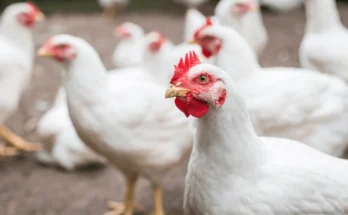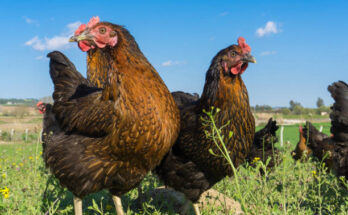Maximizing Poultry Health: A Guide to Nutrition Essentials
Poultry nutrition is a critical aspect of keeping your chickens healthy and productive. Providing the right balance of nutrients through their diet is essential for their growth, well-being, and the production of high-quality eggs. In this blog post, we will explore the key components of a balanced poultry diet and how you can ensure that your chickens are getting the nutrition they need to thrive. Whether you’re a seasoned poultry farmer or new to raising chickens, understanding the fundamentals of poultry nutrition is fundamental to the overall health and productivity of your flock.
Understanding Poultry Nutrition
Key Nutrients for Poultry
Chickens, like all living organisms, require a variety of essential nutrients to maintain good health and high productivity. These include proteins, carbohydrates, fats, vitamins, and minerals. Proteins are necessary for muscle development and egg production, while carbohydrates provide energy for vital bodily functions. Fats are essential for maintaining healthy skin and feathers, as well as storing energy. Vitamins and minerals play crucial roles in bone formation, immune function, and overall well-being.
The Importance of a Balanced Diet
A balanced diet is vital for ensuring the overall health and productivity of poultry. Without a proper balance of nutrients, chickens can suffer from various health issues, including decreased egg production, weak eggshells, and poor growth. Just like humans, chickens need a diverse and well-rounded diet to thrive. A balanced diet not only supports their physical health but also contributes to their mental well-being, keeping them happy and content.
Formulating a Balanced Diet
With the proper nutrition, chickens can lead happy and healthy lives. Formulating a balanced diet for your poultry is crucial in ensuring their overall well-being. Here’s how you can create a well-rounded diet for your chickens.
Protein Requirements
Chickens require a significant amount of protein to support their growth, feather development, and egg production. A balanced diet for chickens should consist of around 16-20% protein. Sources of protein can include soybean meal, fish meal, and dried insects. Ensuring that your chickens receive adequate protein will contribute to their overall health and productivity.
Carbohydrates and Fats
In addition to protein, carbohydrates and fats are essential for providing chickens with the energy they need to stay active and maintain body temperature. Grains such as corn, wheat, and barley are excellent sources of carbohydrates, while fats from sources like sunflower seeds and flaxseed play a crucial role in providing essential fatty acids.
Essential Vitamins and Minerals
Including a variety of vitamins and minerals in your chickens’ diet is essential for their overall health. Vitamin A supports healthy vision and immunity, while Vitamin D is crucial for calcium absorption. Additionally, minerals such as calcium, phosphorus, and potassium are vital for skeletal development and overall metabolic functions. Ensuring that your chickens’ diet is rich in essential vitamins and minerals will help prevent deficiencies and promote optimal health.
By carefully formulating a balanced diet that meets the protein, carbohydrate, and fat requirements, as well as incorporating essential vitamins and minerals, you can keep your chickens healthy and thriving.
Feeding Strategies for Optimal Health
Free-Range vs. Commercial Feeds
When considering the feeding strategies for your poultry, it’s important to evaluate the pros and cons of free-range versus commercial feeds. Free-range feeding allows chickens to forage for insects, seeds, and grass, mimicking their natural diet. This method promotes natural behaviors and may result in eggs with higher nutrient content. On the other hand, commercial feeds provide a balanced diet with essential nutrients and can be convenient for ensuring all dietary needs are met. When deciding on feeding strategies, a combination of both free-range and commercial feeds can offer the benefits of natural foraging while ensuring complete and balanced nutrition. Free range should be your choice if you have the luxury of chosing. We have a post dedicate to improving gut health in your chickens which you can also view here
Feeding Frequency and Quantity
The frequency and quantity of feed provided to chickens play a crucial role in their overall health and productivity. Chickens should have access to feed throughout the day to support their high metabolic rate and egg production. A general guideline is to provide about 1/4 to 1/3 pound of feed per chicken per day. However, adjustments may be needed based on factors such as age, breed, and environmental conditions. Monitoring their body condition and adjusting feed quantities accordingly is key to maintaining optimal health.
Water and Grit Essentials
Water is an essential component of poultry nutrition and is often overlooked. Chickens require constant access to clean, fresh water to support digestion, nutrient absorption, and overall well-being. Additionally, providing insoluble grit such as small rocks or coarse dirt is crucial for aiding in the breakdown of food in the gizzard, contributing to efficient digestion. Including these essentials in the feeding regimen is vital for ensuring the health and vitality of your flock.
Common Nutritional Deficiencies in Poultry
Poultry nutrition is crucial for the wellbeing of chickens. Common nutritional deficiencies can have detrimental effects on the health and productivity of poultry. It is essential for poultry farmers to understand how to identify and address these deficiencies to ensure the overall health and vitality of their flocks.
Identifying and Addressing Deficiencies
Identifying nutritional deficiencies in poultry requires a keen eye for observing changes in behavior, physical appearance, and egg production. Symptoms may include reduced appetite, decreased egg production, poor feather quality, and slowed growth. To address deficiencies, a balanced and fortified diet is key. Supplementing with the necessary vitamins, minerals, and amino acids can help rectify these deficiencies and support optimal poultry health.
Health Implications of Nutritional Deficiencies
Nutritional deficiencies can have significant health implications for poultry. Lack of essential nutrients such as calcium, phosphorus, and vitamin D can lead to skeletal problems such as weak bones and fractures. Insufficient protein can result in reduced muscle development and compromised immune function. Moreover, inadequate levels of vitamins and minerals can impact eggshell quality and overall reproductive performance. It is imperative to address these deficiencies promptly to prevent long-term health issues and maintain the overall vitality of the poultry flock.
Supplements and Additives
Before diving into the specifics of supplements and additives for poultry, understanding their role in maintaining optimal health is crucial. Supplements play a vital role in filling nutritional gaps that may be present in the regular feed. They provide essential vitamins and minerals to support the overall health and well-being of the chickens. On the other hand, additives are incorporated to enhance the effectiveness of the feed, aiding in digestion and ensuring proper utilization of nutrients.
Understanding the Role of Supplements
Supplements are designed to bolster the nutrient content of the feed, addressing specific deficiencies that may be lacking in the chicken’s diet. For instance, calcium supplements are crucial for egg-laying hens to support the formation of strong eggshells, while vitamin supplements contribute to overall health and immune function. By understanding the specific needs of the poultry, supplements can be tailored to optimize their health and productivity.
Safe and Effective Additives for Poultry
When selecting additives for poultry feed, it is essential to prioritize safety and effectiveness. Probiotics and prebiotics are commonly used additives that promote a healthy gut flora, aiding in digestion and nutrient absorption. Enzyme additives can also be beneficial, breaking down complex nutrients in the feed to enhance digestibility. Additionally, natural additives such as garlic and oregano have been found to possess antimicrobial properties, contributing to the overall health of the flock.
Incorporating safe and effective additives, coupled with targeted supplements, can contribute to the overall well-being and productivity of poultry, ensuring a healthy and thriving flock.
Conclusion
In conclusion, poultry nutrition plays a crucial role in keeping your chickens healthy and productive. By providing a well-balanced diet, ensuring access to clean water, and offering appropriate supplements, you can support your flock’s overall well-being and optimize their egg production. Additionally, monitoring their nutritional intake and making adjustments as needed will help prevent deficiencies and health issues. By prioritizing poultry nutrition, you can ensure that your chickens lead happy, healthy lives while also benefiting from their high-quality eggs.



